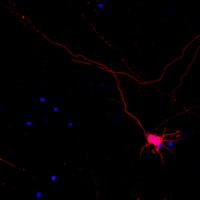Use of ¹¹C-Choline positron emission tomography/computed tomography to investigate the mechanism of choline metabolism in lung cancer.
Huang, Z; Rui, J; Li, X; Meng, X; Liu, Q
Molecular medicine reports
11
3285-90
2015
Mostrar resumen
The present study was conducted to investigate the 11C‑Choline metabolic mechanism and examine the association between 11C‑Choline metabolism and uptake in different pathological types of lung cancer. A total of 18 tumor specimens and corresponding normal lung tissues were collected from patients who were diagnosed with lung cancer using 11C‑Choline positron emission tomography (PET)/computed tomography (CT) imaging between January 2007 and December 2008 at the Medical Imaging Center of the Provincial Hospital Affiliated to Shandong University. The diagnosis was further confirmed pathologically following surgery. Reverse transcription polymerase chain reaction and western blotting were used to investigate the expression of choline acetyltransferase (ChAT) and choline kinase α (ChoK) in lung cancer tissue and normal lung tissue. The 11C‑Choline PET/CT data were analyzed visually and semiquantitatively. Compared with the expression in the normal lung tissues, the mRNA and protein expression of ChAT and ChoK increased in nine and 14 of the 18 lung tumors, respectively. A total of eight of the 18 tumors exhibited significantly increased expression, while three exhibited no expression of ChoK and ChAT. All lung cancer lesions were visualized with 11C‑Choline PET/CT imaging. The phosphorylation and acetylation pathways of choline metabolism may be important in 11C‑Choline uptake and metabolism in different pathological types of lung cancer. | 25591716
 |
Subchronic treatment of donepezil rescues impaired social, hyperactive, and stereotypic behavior in valproic acid-induced animal model of autism.
Kim, JW; Seung, H; Kwon, KJ; Ko, MJ; Lee, EJ; Oh, HA; Choi, CS; Kim, KC; Gonzales, EL; You, JS; Choi, DH; Lee, J; Han, SH; Yang, SM; Cheong, JH; Shin, CY; Bahn, GH
PloS one
9
e104927
2014
Mostrar resumen
Autism spectrum disorder (ASD) is a group of pervasive developmental disorders with core symptoms such as sociability deficit, language impairment, and repetitive/restricted behaviors. Although worldwide prevalence of ASD has been increased continuously, therapeutic agents to ameliorate the core symptoms especially social deficits, are very limited. In this study, we investigated therapeutic potential of donepezil for ASD using valproic acid-induced autistic animal model (VPA animal model). We found that prenatal exposure of valproic acid (VPA) induced dysregulation of cholinergic neuronal development, most notably the up-regulation of acetylcholinesterase (AChE) in the prefrontal cortex of affected rat and mouse offspring. Similarly, differentiating cortical neural progenitor cell in culture treated with VPA showed increased expression of AChE in vitro. Chromatin precipitation experiments revealed that acetylation of histone H3 bound to AChE promoter region was increased by VPA. In addition, other histone deacetyalse inhibitors (HDACIs) such as trichostatin A and sodium butyrate also increased the expression of AChE in differentiating neural progenitor cells suggesting the essential role of HDACIs in the regulation of AChE expression. For behavioral analysis, we injected PBS or donepezil (0.3 mg/kg) intraperitoneally to control and VPA mice once daily from postnatal day 14 all throughout the experiment. Subchronic treatment of donepezil improved sociability and prevented repetitive behavior and hyperactivity of VPA-treated mice offspring. Taken together, these results provide evidence that dysregulation of ACh system represented by the up-regulation of AChE may serve as an effective pharmacological therapeutic target against autistic behaviors in VPA animal model of ASD, which should be subjected for further investigation to verify the clinical relevance. | 25133713
 |











